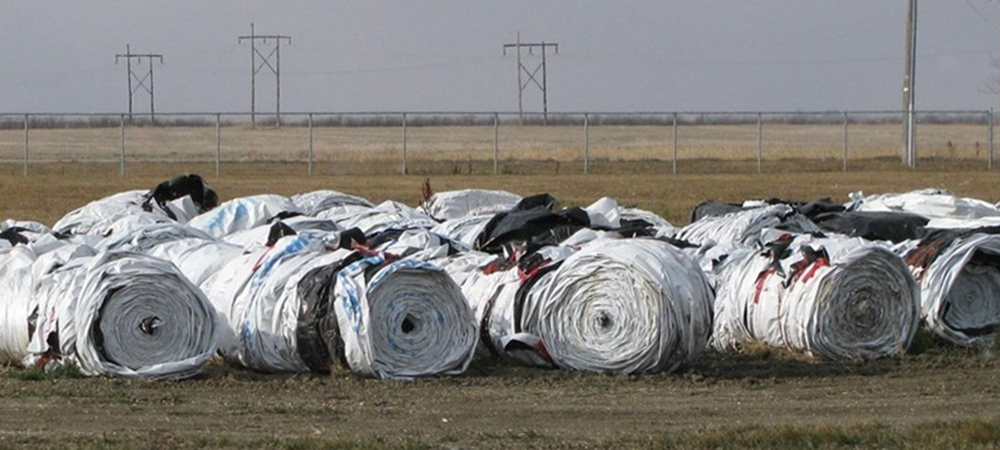
By Harry Brook
Plastic grain bags and silage bags are great ways to provide temporary storage for agricultural crops at a reasonable price. With larger farms, and land being dispersed over a wider area, they are a practical way to store the crop. If the land is rented with no bins on site, a grain bag can solve short-term storage issues.
The problem arises when the bags are emptied and you have to find a way to get rid of a large amount of plastic. This has been an ongoing problem in the province since grain bagging arrived here. There has been a lot of discussion on potential solutions. Now there is a plan to deal with the sheer volume of the problem.
In conjunction with Cleanfarms, the Alberta Plastic Recycling Group is operating a, three-year pilot project to recycle empty grain bags and twine. This is possible due to funding from the Alberta Government. One of the 20 sites selected for this project is Flagstaff Regional Waste Management.
Bags are handy but getting rid of the plastic afterwards can be an environmental nightmare. Some producers, in the past, have resorted to burning their bags, illegally, and creating pollution issues. There has been a couple of places willing to take plastic bags periodically, but not consistently.
This new pilot project will involve the local sites, like the Flagstaff Regional Landfill, collecting the bags then loading them and sending them to one of the two processors in Southern Alberta. Grain bags and plastic twine can both be recycled. However, they need to be reasonably clean.
Shake the bags to remove as much dirt and spoilage from the bag as possible before rolling. If bags arrive too dirty or are loose and unrolled, the bags may be rejected or subject to a landfill tipping fee, or worse, returned to sender. Once cleaned as much as possible, roll the bags tightly with a mechanical bag roller. Under the Canadian Agricultural Partnership there are funds available to help in the purchase of a grain bag roller. It is one of the allowable projects with the Environmental Stewardship and Climate Change projects. Some collection sites may have a grain bag roller available to borrow for that purpose, as well.
With the twine, remove as much debris as possible and bag it in a clear, plastic bag. Poke holes in the bottom to allow drainage and secure the bag with twine or a zip tie. Don’t knot the bag closed. These bags are also available at the collection sites, at no cost. The program only applies to clean and dry twine in recycling bags and the mechanically rolled and compressed grain bags.
Some things that aren’t accepted in this program are silage tarps, unrolled bags, hand-rolled grain bags, net wrap, sisal twine, nylon rope or bale or silage wrap. If you have questions about this program, please call the Flagstaff Regional Landfill (780-384-3950).
This program should help increase the lifetime of the landfill as those plastics will not be buried. You won’t be burning plastic, causing a stink and pollution, and you can’t put a price on the feeling of doing the right thing. Recycle those grain bags and get them off your property.
Harry Brook is Flagstaff County’s Agricultural Fieldman. He can be reached via email at: hbrook@flagstaff.ab.ca or by phone at: 780-384-4138.